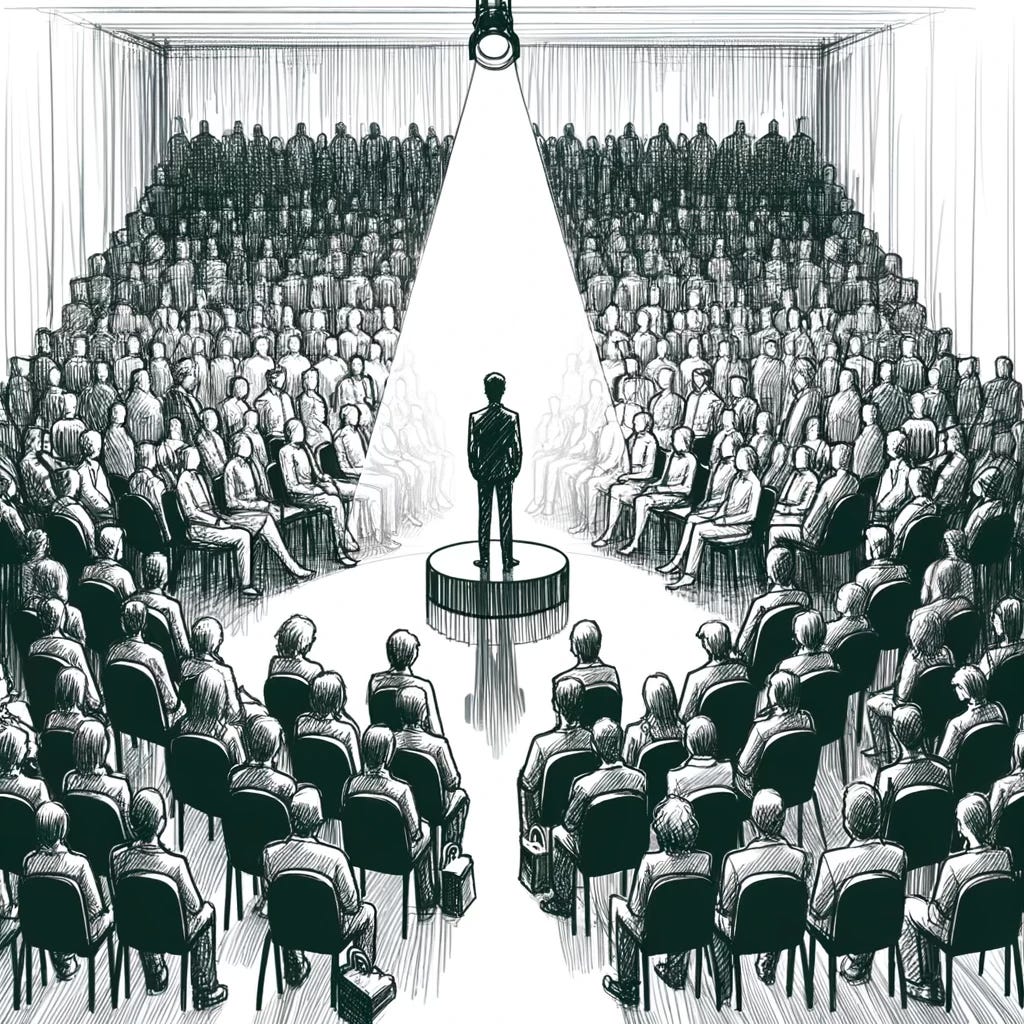Transforming Social Anxiety into a Leadership Strength
Accepting my vulnerability: Being a false extrovert to just go by in Corporate America.
Some close friends know me as an outgoing person with a quick witty sense of repartee but being the “fun” person to be around is not natural for me. By nature, I am timid. I like lonely reflective breaks without any outside world distractions. In short, I am an introvert with social skills I had to master.
As I sit down to share my thoughts, I'm reminded of these moments that, at the time, felt like my ultimate downfall. Picture this: a room full of expectant faces, a presentation that could change the course of my career, and my heart racing like it wanted to escape my chest. The nausea, stomach cramps and of course, the brain fog erasing hours of practice and knowledge. That day, my social anxiety wasn't just a whisper in my mind; it was a roaring tempest. Or so it felt. Yet, here I am, years later, not just surviving but thriving as a leader. How? The journey from that room to where I am now has been one of transformation, and that I completely understood after reading and getting insights from Morra Aarons-Mele's "The Anxious Achiever: Turn Your Biggest Fears into Your Leadership Superpower." This book could have helped me so much earlier in my career. So don’t wait like I did.
Social anxiety is often seen as a barrier in the corporate world, especially in leadership roles. The expectation is that leaders should be bold, unflappable, and always in control (see my previous post on Fearless Leader). But what if I told you that the very anxiety we often view as a hindrance could become our greatest asset in leadership?
The Performer vs. The Guide
In my early leadership days, I fell into the trap of becoming a performer. Social anxiety made me overly conscious of how others perceived me. I was the 'entertainer', constantly on stage, ensuring everyone was happy and engaged. This approach, while momentarily effective, was exhausting and unsustainable. It also created a superficial layer in my relationships with my team. I was a performer, not a guide. And this is the default mode a lot of leaders or people wanted to succeed will adopt. The say “Fake it until you make it” may have worked 30 or 40 years ago but in today’s workforce, authenticity is crucial. The “bring yourself to work” is becoming a mantra (well, don’t be a performer but if your personality is quite not ordinary, still remember this is work so be attuned of your surroundings).
Morra Aarons-Mele's book opened my eyes to a different path. She argues that our anxieties, when understood and harnessed correctly, can make us more empathetic, thoughtful, and genuinely connected leaders. It's about shifting from performer to guide.
The Impact on Company Management
When leaders operate more as entertainers than guides, it affects the entire organizational culture. Decision-making becomes more about maintaining a persona or a facade rather than what's best for the team or the company. Innovation suffers because the 'performer' leader is often risk-averse, fearing failure or judgment or being discovered for “faking it”.
In contrast, when leaders embrace their anxieties and use them to fuel genuine connections and understanding, it creates a culture of trust and openness. This environment fosters creativity, risk-taking, and honest communication, which are vital for any company's growth and success.
Transforming Anxiety into a Leadership Superpower
Embrace Vulnerability: The first step is to accept and embrace your social anxiety. Vulnerability is not a weakness; it's a powerful tool for connection. When I started sharing my challenges with my team, it didn't diminish their respect for me. Instead, it opened a channel of authentic communication and mutual support. It also created some fun routine. I am usually soft-spoken, no need to raise your voice as a leader. Yet, I also used to sing opera/operette as a young college student to make some easy money so I can amplify my voice quite a lot when needed. At large event, there was never a need for a bullhorn to gather attention. I didn’t like to do it but my team knew it meant the moment was important. The fun part was for my team to observe the reaction of new hires who were not aware of the lung capacity of their soft-spoken leader.
Develop Empathetic Listening: Social anxiety often makes us acutely aware of others' emotions and reactions. Turn this into a strength by practicing empathetic listening. This skill helps in understanding team members' perspectives and needs, leading to more inclusive and effective decision-making. It also forces you to not take everything personally. Sometimes during an interaction, someone may react unpredictably, most of the times, it’s about something else than you.
Mindful Decision-Making: Anxiety can cloud judgment with fears and what-ifs. Mindful decision-making involves acknowledging these fears but not letting them dictate your choices. It's about being present, considering various factors, and making decisions that align with your values and the company's goals.
Foster a Culture of Openness: As a leader, you set the tone. By being open about your challenges, you encourage others to do the same. This openness leads to a more supportive and collaborative work environment, where people feel safe to share ideas and concerns.
My journey with social anxiety has been challenging, but it has also been one of the most rewarding experiences of my professional life. By turning my biggest fears into my leadership superpower, I've not only grown as a leader but have also helped foster a more authentic, innovative, and empathetic workplace culture. For anyone struggling with social anxiety in a leadership role, remember: your anxiety doesn't define you. It's a part of your unique leadership style, and when harnessed correctly, it can be your greatest asset.








